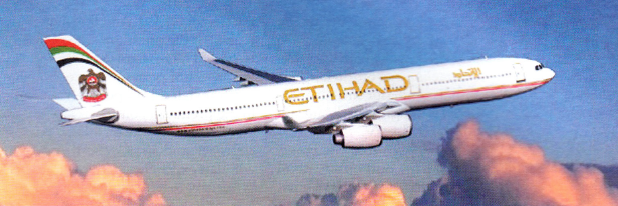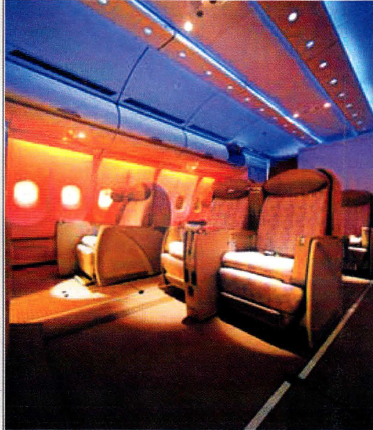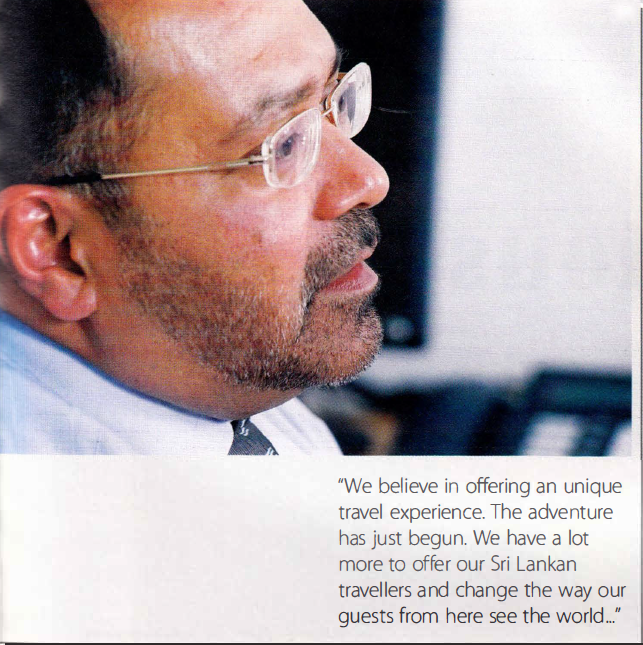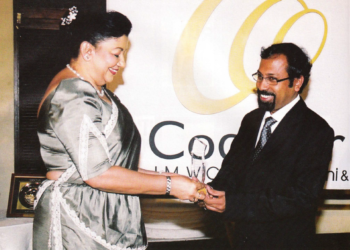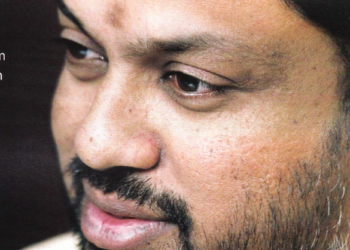The Pro-Active Airline Approach
Etihad Airways is creating a “buzz in the city” with its unique marketing strategy and brand offering. “Our core philosophy is the belief that people o 4y with us are our guests and no mere passengers,” Kumar de Silva, Area Manager, Sri Lanka Maldives for Etihad Airways, told Sassan a Samarakkody of Business Today. He spoke about the challenges involved in setting up Etihad Airways in a competitive environment and the future goals of the airline.
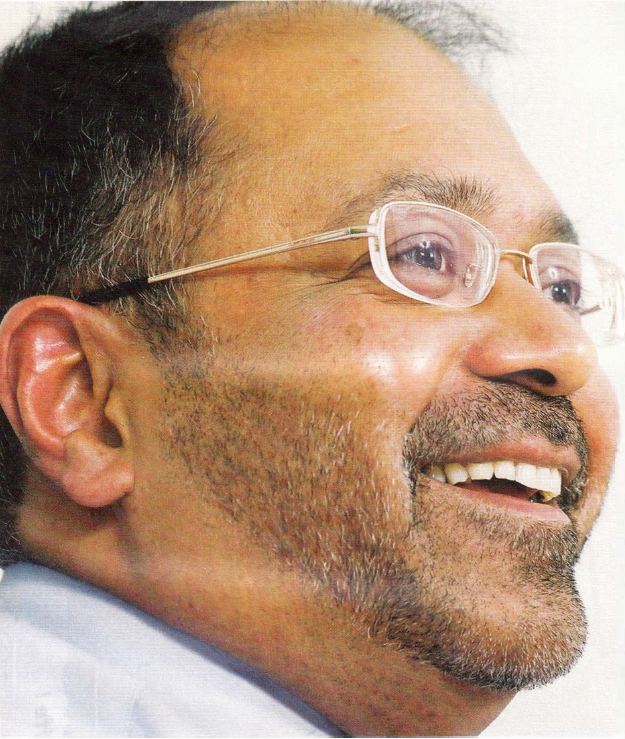
Colombo was the first international destination, outside the UAE, to which the Abu Dhabi based Etihad Airways chose to fly in March 2004. “I landed in Colombo about ten days prior to the arrival of the first flight, with 500 tickets in my bag and no office. I commenced operations from a hotel room,” recalled Kumar de Silva. “Initially it was two flights a week, which increased to five and then to daily flights between Colombo and Abu Dhabi. We achieved this within 21 months, which I am proud to say is a first in the history of aviation. No airline has expanded during such a short time and so rapidly in the market here.” The strategy from the inception was to build a unique product with a competitive advantage. “Since we commenced operations we always looked at positioning ourselves very differently in the market place. We simply didn’t want to follow the prevailing trends, but concentrated on developing a new travel experience,” de Silva said. “Rather than being re-active, we believe in being pro-active and challenging the existing norms by developing a unique product with a competitive advantage. Interestingly, our existing and potential guests have accepted this shift from the traditional approach. These are changing and exciting times, with more and more people looking for options when it comes to air travel.”
De Silva counts 26 years in the travel industry since starting his career as a reservations agent with Singapore Airlines. He later worked for Thai International and Sri Lankan Airlines. He is a Fellow of the Chartered Institute of Management Accountants, Associate member of the Chartered Institute of Marketing and a member of the Chartered Institute of Logistics and Transport. Why did Etihad choose Sri Lanka as its first international destination? “Firstly, the link between Sri Lanka and the UAE is very strong with a lot of Sri Lankans working in the Middle East. On top of that, there is huge potential for promoting inbound traffic, considering the approximately 75 percent expatriate population in the UAE. “We hope to market Sri Lanka as an attractive holiday destination to this segment. In addition, we will have the potential of offering the Sri Lankan traveller a choice of destinations, with the addition of a direct flight to ew York in October, with a stop-over in Abu Dhabi.
“All our efforts are directed at looking at initiatives which can then be translated into aspirations and the needs of consumers and make it a reality for them. For this, we are using a completely different platform, so to speak. “Our fundamental base is that we treat everyone who travels on our airline as a valued guest. We make no distinction, and at every point of interaction, our staff will ensure that our guests are provided the best possible service. We provide an unhurried in-flight experience, where the guest can relax and enjoy a personalised service. Our ratio of host to guest to fusion cuisine is unique in, in- flight dining, catering to the diversity of our guests whom we carry on board. “Then, the demarcation of zones – Diamond, Pearl and Coral – that we have developed, I believe is a very fresh approach. The Diamond Zone for instance, is what other carriers call first class while Pearl is equal to business class. Then there is Coral, which we do not want to put into a specific class, as we believe in providing a unique service to all our guests. We want to re-write the rule books when it come to air travel, and to challenge the accepted norms.” After just 32 months in operation, Etihad now flies to 34 destinations around the world. According to de Silva this has never happened before in the history of airline operations. Since the inception of the airline in 2003, it has been growing at a pace that is unprecedented in the airline industry. “I understand that a business case study is to be conducted on this achievement since none of the other air-lines have experienced such phenomenal growth within such a short period,” said de Silva proudly.
Etihad is fast gaining a reputation as an elite international airline, with destinations in Europe, the Middle East, Africa, North America and Asia, managed by a team of experienced airline professionals drawn from over 50 nationalities. The airline created history by placing the largest ever order for new aircrafts, by a newly established airline. It will also be one of the first to fly the new A380 double-decker planes when they are introduced. The core philosophy of the airline – that passengers are treated as guests and not mere passengers – is reflected in the choice of aircraft. These are chosen to match the airline’s concern for the comfort of its guest . The airline ha selected the Airbus A330-200 as the backbone of its fleet, offering wide-bodied comfort in all zones. This aircraft can transport 225 guests in a three-zone cabin la out over a range of 10,-100 km. Built to Etihad’s specifications, the two-zone Boeing 777-300ER can accommodate 28 guests in the Pearl Zone and 350 guests in the Coral Zone. In the Pearl Zone, seats recline into 6ft lin long flat beds and have superior in-flight features, including high-speed Internet connections and live TV. De Silva believes that the country’s potential for outbound travel was often underestimated.
“We must remember that Sri Lanka is an island, and how important air travel is to everyone. As for our company’s marketing strategy, we identify the different segments and guests’ needs and give them a unique offering, to meet their specific requirements. “For instance, when it comes to students who go abroad for studies, what was given to them was generic. We on the other hand have identified their actual needs and offer them a good fare, more baggage allowance, and so on. “Then in the middle of February we conducted a very successful Valentine’s Day promotion through the print and electronic media, where one could buy two tickets for the cost of one. An air ticket is something one would like to give a spouse or partner. So we ended up with a very special promotion with a response that was far beyond expectations. “We also looked at special interest groups, like those who wanted to travel to Germany to watch the football or to the UK for cricket. And then when we looked at the premium side of flying, we found there was a very wide gap in the aspect of pricing – where it never got translated into people travelling in the premium zones. “So we introduced a keen pricing approach and strategy so that people will start experiencing premium travel. We believe that in future this is going to be a growth segment. Therefore we are very keen and committed to develop this particular area,” said de Silva. Among the airline’s value-added product offerings are a free limousine service and the guest recognition programme that was launched in August. The airline is also seriously looking at promoting air travel outside Colombo and the suburbs. “This is a segment with a lot of potential and needs leadership.
Earlier, air travel was only for a selected few, but now with the expansion of the economy, globalisation, and so on, more and more people are travelling, either on business or leisure. If you study the issuance of visas, more than 10 percent are issued to people who have applied to travel on holiday to exotic locations.” The marketing strategy of the airline is to encourage more people to travel by offering value for money options. The company has not confined its media advertising to the English medium, but has launched aggressive advertising drives in Sinhala and Tamil as well. Offering easy payment terms for the purchase of air tickets through certain financial institutions, is another encouraging step forward. De Silva said: “We consider promoting air travel outside Colombo as an investment in the future, as there is a lot of potential in this untapped market. It will also be a positive development for the country as a whole. Because the outlook of society will change for the better with exposure to the outside world and air travel becoming an important part of life.” The strategy of the airline is to continually make product offerings to keep the cycle moving throughout the year rather than at a particular period of the year. “Traditionally there are peaks, for instance during school holidays, when people want to travel overseas with their families, there always was a shortage of seats. We believe in stimulating traffic with value for money options throughout the year,” de Silva said.
Globally, there is an increase in business and leisure travel, especially in the Asian region, with China and India projected to be the leaders in the future, according to de Silva. “Therefore, the airline industry has to come up with new initiatives to make air travel exciting and stimulating, such as budget travel options and value addition.” De Silva believes that the competition offered by low cost carriers is good for business as a whole because it will encourage more people to travel by air. “With new technological inputs, the distribution systems have changed, for example, in the purchase of an air ticket,” he said. “In the developed countries travellers can browse the Internet and pick an offer that interests them and then purchase the ticket on-line. However, in our part of the world, travellers seek the services of a travel agent due to the necessity of obtaining visas for most destinations. However, Internet bookings are becoming increasingly popular.”
Speaking about the impact of increasing fuel prices, de Silva said: “We at Etihad work within a framework where we look at what is controllable. In such a situation you always have to look at initiatives and ways and means of overcoming problems, rather than sit and complain about cost, etc.” As for human resources, the team in Sri Lanka is young with many being recent school-leavers, as well as those with experience. “We have achieved a balance between those with experience and those without any exposure to the working world. The reason why we decided to employ young people without experience is because, as a new airline, we wanted to train staff to absorb the organisation culture from day one. “Our staff are all given thorough in-house training and those with potential are sent for training to our head office in Abu Dhabi. What is primarily required is the correct attitude, getting the simple things right and building and promoting the culture of the organisation.” Unlike most international airlines, Etihad is represented in Sri Lanka as a direct airline office and does not operate through a GSA (General Sales Agent).
De Silva explained: “At the very beginning we had a GSA who supported us, but the company decided to directly represent itself in the market place because decision-making speed is critical when dealing with air travel. We are also in a better position to understand the market dynamics and respond quickly to the changing conditions. “At the same time it’s a cost effective exercise as well. When you are represented directly, the market is looked at in a very different manner. For instance, the airline could relate with the current corporate objectives and respond without any hindrance or delays. In all markets Etihad is represented directly and all our staff our direct employees of the airline.” Etihad’s market share rankings are in the first three slots in every market in which the airline operates. “We believe in offering nothing but the best. This is only the beginning and in the future we will have a lot more to offer our Sri Lankan travellers,” said de Silva.
